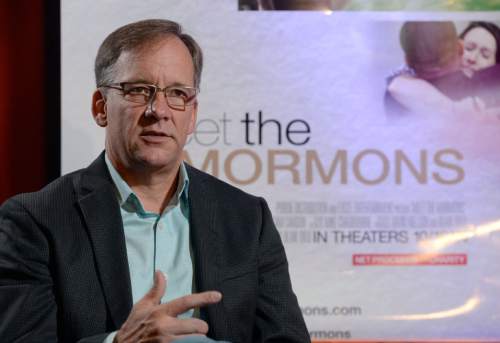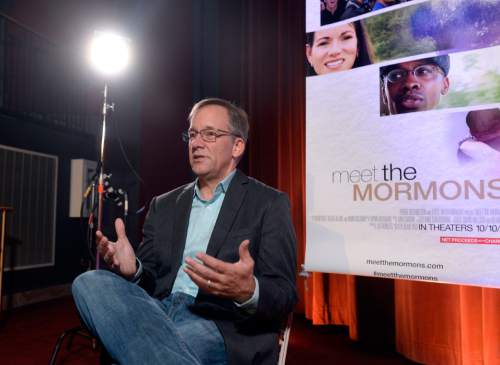This is an archived article that was published on sltrib.com in 2014, and information in the article may be outdated. It is provided only for personal research purposes and may not be reprinted.
Larry H. Miller discovered, the hard way, that the movie business isn't like the car business.
Miller, who died in 2009, made his fortune as an auto dealer and invested much of that in real estate and in sports teams — namely, as owner of the Utah Jazz. But movies became a sideline of the Miller empire, as an exhibitor (launching the Megaplex chain) and, briefly, as a movie producer.
It was as a movie producer that Miller suffered a lot of frustration and a rare financial failure — when he bankrolled three movies based on "The Work and the Glory," Gerald N. Lund's series of historical novels set during the founding days of The Church of Jesus Christ of Latter-day Saints.
For Miller, a devout Mormon and personal friend of Lund, supporting the movie series was more about devotion than turning a profit. But he told me in 2006 that the experience "extinguished" his drive to produce movies.
The problem is that movies don't work the way his other businesses do. Put a good car on the lot, or a winning team on the court, and people will pay money for it. The movies don't always work that way.
"There can be some really well-done stuff — cinematography-wise, story-wise, even acting-wise — and not have it do well," Miller said in 2006.
It seems many people who jump into moviemaking discover this. It's especially true, it seems, for people who try to make movies with a religious message.
"Film Critics Don't Get Faith Films," read a press release I received last week from a Utah publisher promoting a Christian-themed movie hitting theaters in November.
The publisher pointed out the box-office success of Christian-based movies like "God's Not Dead" and "Heaven Is for Real," both of which scored poorly with critics while ranking better with audiences.
Figures were cited from the review aggregation site Rotten Tomatoes. "God's Not Dead" scored only 17 percent favorable from critics, but 83 percent favorable from fans. "Heaven Is for Real" got a pass from 46 percent from critics and 71 percent of audiences.
First, using Rotten Tomatoes as a guide is a tricky proposition because that site's yes-or-no rating system, "fresh" or "rotten," allows no shades of ambiguity. (Metacritic, an aggregation site that rates on a 1-to-100 scale, allows for such nuance.) Also, Rotten Tomatoes' audience ratings can be fudged by block voting, sometimes from people who haven't even seen the movie.
The Rotten Tomatoes argument has surfaced with regard to "Meet the Mormons," the documentary produced by the LDS Church that featured six diverse church members describing how their faith informs their life.
The LDS Church-owned Deseret News, which became the de facto marketing division for "Meet the Mormons," last week cited the movie's 92 percent audience score on Rotten Tomatoes, compared with the zero percent it was receiving from the critics. (That critics score is up to 11 percent now after a positive review — by Bruce Bennett of The Spectrum in St. George — was posted to offset eight negative ones, including my middling 2 ½-star review.)
The Deseret News quoted the movie's director, Blair Treu, about questions of critics having an anti-religion bias.
"There does seem to be a number of reviewers who are skeptical of any kind of religious faith, across the board," Treu told the Deseret News. "[There's] almost a predisposition that 'If it's promoting or fostering any kind of religious belief, I'm not comfortable with it.' "
I won't speak for other critics, but I can speak for myself: It's just plain wrong.
My bias as a movie critic isn't against religion or any other subject that may come up in a movie. My bias is toward the movies.
Give me a good movie, something with an interesting story that makes me feel and think and relate to the people portrayed onscreen, and I'm going to like it.
But if you give me a movie that doesn't do those things — and assumes that it should get a free pass because it espouses a particular faith — I'm going to critique it honestly and point out its faults.
The movie has to be able to tell a story, not just deliver a message — and it doesn't matter whether a movie's message is "Jesus Christ is Lord" or "Adam Sandler is a comic genius." Also, I'm reviewing the movie, not the source material, and that's true whether the source is "The Hunger Games" or the Book of Matthew.
I can cite recent faith-based movies that succeed on a cinematic level. Darren Aronofsky's "Noah," released in March, was an artful and complex take on the story of Noah and the ark — one that depicted Noah (Russell Crowe) as a flawed human being, not as a plaster saint. And just this week, we have "23 Blast," a moving drama about a teen football star who goes blind, but carries on with support from his family and his faith.
If you want to jump into the movie business, you have to learn to take your lumps, whether from critics or a fickle public — and remember that even making a good movie doesn't guarantee success.
So why does anyone make movies? It's a leap of faith.
Sean P. Means writes The Cricket in daily blog form at http://www.sltrib.com/blogs/moviecricket. Follow him on Twitter @moviecricket, or on Facebook at http://www.facebook.com/seanpmeans. Email him at spmeans@sltrib.com.





